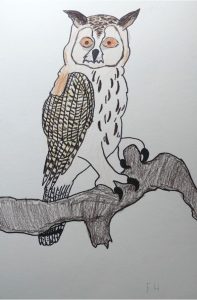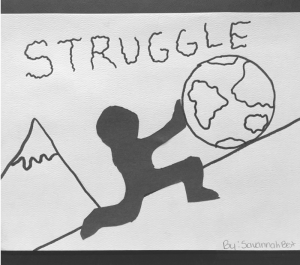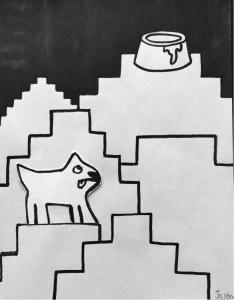
Archives
Struggle

Thirsty Dog

Happiness
Happiness is not the feeling of being unloved or unwanted.
Happiness is not letting people get in the way of a good mood or Happiness.
Happiness is not settling for less.
Happiness is like the fresh taste of chicken and waffles on a Sunday morning.
Happiness is like the feeling of a little gust of wind against your face as you’re sitting up on the beach.
Happiness is knowing your worth.
Happiness should always be used in only the right but never the wrong ways.
Be HAPPY because HAPPINESS is the only and best way to live. You can only truly be HAPPY if you want to because no one can do it for you but YOU!
*REMEMBER* do it for you, and only you. No one but YOU!!
KEEP CALM AND BE HAPPY
Community Poem
My home
My school
My own little world
The sky
Big trees
Stone houses
The world stretches further
But I love my bubble
And my love
Stretches farther further
Than words
Animals, plants
They are safe
They are calm
They are beautiful
My mind can save the violence
My mind can save the world
Education, bravery, knowledge
Art, logic, creativity
Justice
Beauty
Sparkling hearts of sandstone and ruby
Emerald and gold
Light dancing across emotion
Changing the way we view life
The way we view the world
The world might stretch
Until the small bubble bursts
But even in silence
There is still the music
Of love
Communities
Laughing and talking
Immersing ourselves into each other
Naturally echoing
Echoing, Echoing
I am never part
Of any community
Unless….
Someday,
we will all agree
That we’re together
We will all agree
Someday
I want to be a better listener
I want to be a better friend
I want to change the world
And make a print of my hand
In blood-red ink
On the world
I want to change communities for the better
I want to make them beautiful
My bubble expands
The tips of my fingers
Graze the surface
Of nowhere
Life is breathed
Through all sides
Love
Love
Love
A trusting home
Uniquely beautiful
Depending on the little lights
Shining
Sparkling Dancing
Within
Reunited
When I was a baby, I had a dad. But my mom and dad broke up as I was growing up. I did not know who my dad was. I heard that he was smart and he loved me. He took care of me and protected me from harm. He saved everyone in Paris, because he was a superhero. But, because he was a superhero, he had to leave in order to protect me.
One day my mom was talking to me about my dad. She told me that he was like a superhero. She also told me what stores he likes and what food he likes. Therefore, I went to all the stores and ate all of the food he liked.
There was this one store, where I had to pay a lot of money. But to pay for everything, I had to make money. In order to make money, I had to sing.
I went to the store and this man came up to me and said, “What is your name?’’ I said, “Leric.’’ He replied, “My name is Eric”.
I asked , “ Do I know you?’’
He said, “No, but I know you.’’
“Who are you?” I asked.
He said, “I… am your dad.’’ I was shocked. That day I was able to take my dad home with me. We had a good time together.
Later on, I was playing hide-and-seek and my dad couldn’t find me. I turned invisible! He realized that I had been turned into a superhero, like him!
He then told me the real story, that he was Cat Noir, a famous superhero from Paris. He also showed me how he transformed into Cat Noir.
He has a Kwami, a flying pet that no one else can see except for me and the other superheroes. My dad’s suit was all black, with a black belt as a tail, a choker that has a cat bell, green cat eyes, and a black mask. He also had cat ears.
I had a Kwami, named Tikki, meaning that I was a superhero. My name was Ladybug.
I joined my dad on his missions and helped him to save the world. My mom was happy, and my mom and dad became friends again. We spent time together as a family. We all were happy.
The end.
Ocean
The ocean is blue,
It tastes like salt,
It sounds like the waves,
It smells like marine life,
It looks like the rippling surface,
It makes me feel happy.
Dressed Up
Dressed up with a bow
Dancing, singing as I go
To go see JoJo
Power in Pain
I remember this like the back of my head. I was nine years old, and my life was changed forever.
I was very close to my stepdad. His name was Aaron. We lived together for a year before he proposed to my mom. She was pregnant with my little brother. I was happy, and I really wanted them to get married. What’s insane is that the same day he proposed to my mom, my stepdad passed away because he got set up.
Aaron got a phone call that his little brother was at the bar fighting, so he went to the bar. When he got there, his brother was not there. Aaron didn’t even get inside the bar yet before he was killed.
He was shot three times in the back of the head.
I remember one day I saw him at the end of my bed and we started having a conversation and he said he would come back to the family and he hugged me. Then weird stuff started happening to me. I started getting weird powers. I think it was from the hug he gave me superpowers and I started helping people.
I was sitting in my dark room and I saw a light flash — and BAM! — there he was, sitting down right next to me on the edge of my bed. We had a long talk about how I felt, about how everything was different since he left. He started to seem like he needed to rush to go somewhere. He wouldn’t tell me where he was going, but he turned to me and gave me the biggest hug I’ve ever had. As he disappeared, I felt a rush through my whole body. Strangehings started to happen to me.
I started getting powers, like crazy mental powers that let me feel other people’s pain. This was a lot and really hard for me to handle at first. I didn’t want this power. It made me feel so sad to know how badly everyone around me felt.
That’s when I decided to start using my power to help people. I realized I am able to protect people by letting them know I understand and I want to help prevent it from happening. I now use this power to help the whole world. Everyone goes through pain, but I am here to help, thanks to my stepdad.
We Need to Change
I heard a scream. It sounded familiar. The sound too familiar, like it came from someone I am with every day. I raced to the end of the schoolyard where I heard the scream. There I found my brother being bullied. It was the girls who make fun of everyone: the mean girls.
I quickly yelled to my best friend, Melody, for backup. Melody was always there for me. “Hey, there!’’ I said to The Mean Girls, “Stop bullying my brother!” “Or what?’’ the girls replied. As they walked off, I angrily took my brother home.
I did not know how to get revenge on them. It definitely would be hard. Their dad is the principal. I could not do something mean, or else they would tell their dad. I had to tell them something that will stick. I really needed to help my brother, because my mom died, and my dad is in the hospital, and I am the only one he has. So I came up with a plan.
Friday, I decided to go to the principal. I walked into the door and walked straight into the principal’s office. “Good afternoon principal Haney,” I said in a strong voice like Dr. Martin Luther King Jr., said in his speeches. “I need to tell you something. Your daughter and her friends have been bullying my little brother!”
“How do you know that?” The principal replied.
“I watched them, we need a change!” my voice shook.
“I don’t think so,’’ the principal replied. “Here, use this to record their voices while they… IF they bully your little brother.” He passed me a camera. I knew two things wrong with this already. I had to see my brother bullied again. And I had to watch and record while it happened.
There they were standing on the street yelling and teasing my brother. I turned on the camera and recorded. It was terrible watching my brother being bullied, but I had to wait. I needed to make a change: to put an end to the bullying. This was the only way to do it.
After five minutes, I turned off the camera, and pulled my brother to go home. “Why were you standing there not helping me’’? My brother asked. “You’ll see,” I said, “Tomorrow morning.”
The next day, as fast as possible, I went to the principal’s office with a smile on my face. To my surprise, the mean girls, and Melody were already there. “I called the girls to my office, and this girl came,” Principal Haney said. I handed him the camera. He turned it on, and it started to play.
As soon as the camera started playing, the principal was gasping in shock. After about two minutes passed, he turned it off. He looked at the girls angrily. I was happy for me. I listened to the principal yell at the girls. After that, they said “sorry.” I was happy. They stopped bothering us, and they never bothered anyone else anymore.
That incident has taught me to speak up, and do things that I do not like stop people from bullying.